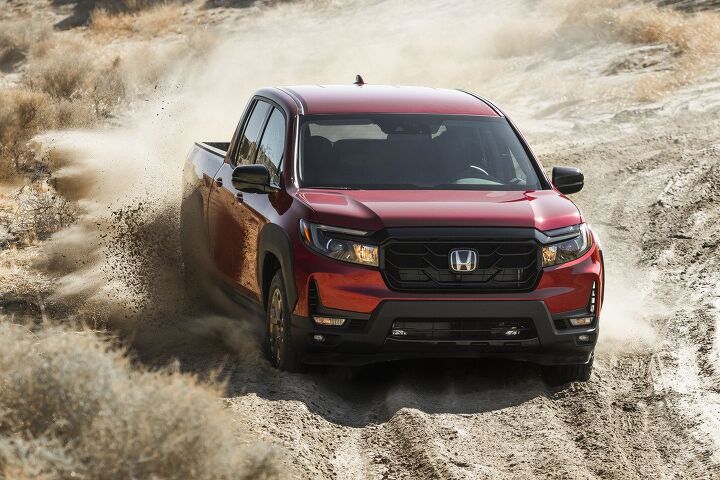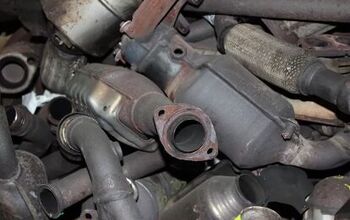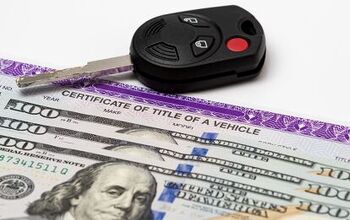Brake Recall Impacts 124,000 Honda and Acura Vehicles

A handful of Honda models, and one from Acura, are under recall over a defect that could limit braking functionality. Impacted vehicles include the 2020-2021 Honda Civic, 2021-2023 Honda Passport, 2021-2022 Honda Pilot, 2020-2023 Honda Ridgeline, and 2020 Acura MDX.
A recall report filed with the National Highway Traffic Safety Administration (NHTSA) specifies improper assembly of the tie rod fastener that’s connected to the brake master cylinder and booster. Altogether, the recall encompasses 124,077 individual vehicles.
From the report:
The brake master cylinder may have been improperly fastened to the brake booster assembly during production, resulting in loose or missing tie rod nuts. During application of the brake pedal, a bending load may occur upon the brake booster assembly tie rod studs. As a result, the tie rod studs may break, leading to the brake master cylinder separating from the brake booster assembly and a failure to comply with Federal Motor Vehicle Safety Standards (FMVSS) 135 – Light vehicle brake systems.
Obviously, having the master cylinder separate from the brake booster isn’t going to improve anybody’s stopping power. Diminished braking performance is a given, with there being a possibility of a total loss of braking function. The report also states that there probably won’t be any warnings issued to drivers via instrumentation if something goes wrong.
It also blames the supplier, VBS, after Honda found a missing nut in 2020. VBS “implemented countermeasures” to ensure there were no additional defects. However, Honda received a quality report on brake failure in 2022 that encouraged the company to launch a full investigation.
VBS submitted part defect reports to the NHTSA earlier this year, followed by the serial numbers of the suspected parts involved in their recall as Honda continued its investigation. By June, Honda determined that a defect related to motor vehicle safety and FMVSS noncompliance existed and decided to conduct a safety and noncompliance recall.
At the time, Honda had received two warranty claims related to the issue between September 2022 to June 2023. There were no reports of crashes, injuries, or deaths related to this issue.
The manufacturer intends on issuing formal recall notices in August. But concerned owners can head over to the NHTSA recall website to determine whether their car is included in the recall campaign. Just be sure to have your VIN handy.
[Image: Honda]
Become a TTAC insider. Get the latest news, features, TTAC takes, and everything else that gets to the truth about cars first by subscribing to our newsletter.

A staunch consumer advocate tracking industry trends and regulation. Before joining TTAC, Matt spent a decade working for marketing and research firms based in NYC. Clients included several of the world’s largest automakers, global tire brands, and aftermarket part suppliers. Dissatisfied with the corporate world and resentful of having to wear suits everyday, he pivoted to writing about cars. Since then, that man has become an ardent supporter of the right-to-repair movement, been interviewed on the auto industry by national radio broadcasts, driven more rental cars than anyone ever should, participated in amateur rallying events, and received the requisite minimum training as sanctioned by the SCCA. Handy with a wrench, Matt grew up surrounded by Detroit auto workers and managed to get a pizza delivery job before he was legally eligible. He later found himself driving box trucks through Manhattan, guaranteeing future sympathy for actual truckers. He continues to conduct research pertaining to the automotive sector as an independent contractor and has since moved back to his native Michigan, closer to where the cars are born. A contrarian, Matt claims to prefer understeer — stating that front and all-wheel drive vehicles cater best to his driving style.
More by Matt Posky
Latest Car Reviews
Read moreLatest Product Reviews
Read moreRecent Comments
- Jeffrey Henry Ford said about innovation, “ If I had asked my customers what they wanted, then they would have said a faster horse." Change is inevitable!!!https://www.wri.org/insights/countries-adopting-electric-vehicles-fastest#:~:text=Currently%2C%2016%20countries%2C%20including%20Canada,create%20and%20enforce%20such%20policies.
- ToolGuy If these guys opened a hotel outside Cincinnati I would go there to sleep, and to dream.
- ToolGuy Michelin's price increases mean that my relationship with them as a customer is not sustainable. 🙁
- Kwik_Shift_Pro4X I wonder if Fiat would pull off old world Italian charm full of well intentioned stereotypes.
- Chelsea I actually used to work for this guy


































Comments
Join the conversation
"December 2020 Honda manufacturing found a missing nut missing from the brake booster assembly tie rods and notified the component part supplier, VBS. VBS implemented countermeasures to prevent a reoccurrence. No outflow from the occurrence was found."
• What does that last sentence mean exactly? (Your individual spin is welcome)
I'll give Honda props for getting after the problem, unlike a certain company headquartered in downtown Detroit in a certain cylindrical skyscraper with ignition switches!